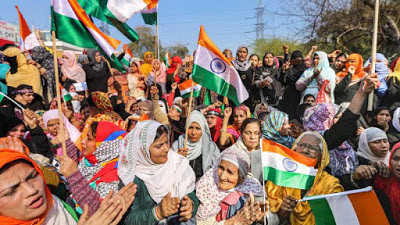India: Women of Shaheen Bagh Challenge Fascism
Never in the history of Muslims, there arose a movement led by women to protect the constitutionally guaranteed secular and plural structure of a country as they rose in Shaheen Bagh, a small residential district in New Delhi. Perhaps it would be appropriate to say that this women-led movement is unique in the history of the world.

No one would have thought that those who live on the margins of their community would motivate and galvanize millions around the world and mobilize them to be activists rather than passive spectators.
It is feminism at its best. It is resistance at the peak, and it is a revolution with far-reaching consequences not only for Muslims in India, but in the rest of the world as well. It is not an exaggeration to foresee a future where every movement led by women will feel its impact.
It started as a protest against the notorious Citizenship Amendment Act (CAA) that the Hindu nationalist party government passed in India’s parliament on December 11, 2019. Soon, it became the movement for the protection of India’s constitution, and now it is a revolution that every law-abiding, secular, and democratic Indian wants to identify with.
This movement drew crowds in millions all over the country. It led several state assemblies to pass resolutions against the CAA. It brought the secularists and democrats on one platform, and it exposed the fascists who want to turn India into a Hindutva Rashtra.
Shaheen Bagh women are average Muslim women. They do not belong to any political party or identify with any religious sect or institution. Most of them grew up in an environment that put restrictions on their movement and participation in public life. They come from various strata of the middle-income group. Their entry into Muslim public institutions such as mosques and Islamic centers was restricted, so they had little opportunity to listen to the religious sermons of their leaders. Even if they had gone to mosques and Islamic centers, and the speeches might have told them that their place is within the four walls of their homes, or they have to serve their husbands, or they must not speak in front of men. Yet they gathered information about their world through the internet or joining WhatsApp groups of sisters or news circulated through television, etc.
They felt suppressed in a male-dominated world. But when these women saw their daughters and sons beaten mercilessly by the Delhi police on December 15 at Jamia Millia Islamia, they could not hold their anger back. They came out in the streets against police brutality. The protest evolved into a movement for the protection of the constitution, and soon India’s women, in general, responded to their sisters and daughters in Shaheen Bagh.
Today, in hundreds of cities across India women are out on the streets, braving harsh winter and vulgar attacks on their integrity and character. The fascist party’s leaders called them Pakistani agents, or terrorists or traitors. Some even went to the extent of calling them, whores. Yet these women in their hijab and niqab did not let their dignity leave them. They stood their grounds firmly, and even after 70 days of protest, they are as enthusiastic as they were on the first day.
The Supreme Court of India, which symbolizes the values of a male-dominant institution, could not capture the essence of the movement. It reduced its importance by declaring a dispute over road closure. The 100-meter space these women have occupied in Shaheen Bagh has become a priority of the Court, not the constitution that these women are determined to defend.
The women of Shaheen Bagh do not trust the present government of India. In their view, it consists of fascists and liars. They believe that the ruling party is using its majority to change the ethos of India. They strongly feel that religion does not determine citizenship, and people have a right to live with dignity in their own country.
These women have shown the world that despite all obstacles and impediments, people can rise and peacefully bring about changes. They have shown discipline, responsibility, and dedication to the cause, and they have created a role model for the women of the world. Hopefully, they will inspire Muslim women around the world to defend human dignity and plural values so that no one feels excluded.
By: Aslam Abdullah
First published here: https://www.islamicity.org/22847/women-of-shaheen-bagh-challenging-fascism/


